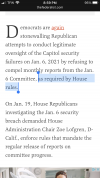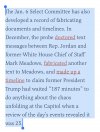They were alternate electors in case the court cases went their way. Everyone knows it. There is precedent of doing this back in 1960 presidential election in Hawaii. It’s a nothingburger.
That's one point of view. State and federal prosecutors and other officials see it differently, which is why the so-called "alternate electors" are now being investigated for election fraud and other crimes. If they are charged and convicted, they face years, not months, in jail.
Regarding the Hawaii precedent, it seems to me to be an apples-to-oranges comparison that does not apply in this case. "Seems to me" means little beyond me expressing my view. The Hawaii precedent argument will certainly be heard by the courts if the cases proceed to court, which seems likely at this point. The applicability of the precedent will be formally argued in court by experts who are learned in the law.
Looking into the Hawaii precedent further, I came across the following, written shortly after the Electoral College affirmed Biden's victory. You'll see there are major differences between the 1960 Hawaii electors context and the 2020 multi-state "alternative electors" context.
----------------------------------------
HAS ANYTHING LIKE THIS EVER HAPPENED BEFORE?
Yes, actually. In the 1960 election between John F. Kennedy and Richard Nixon, Hawaii’s Republican governor certified a Republican slate of electors after the initial count had Nixon winning the state by about 100 votes. But Democratic electors met anyway and insisted that Kennedy would win an ongoing recount.
The Democrats were right, and when it came time for Congress to consider which group of electors to count, it chose the Democratic one. It was Nixon himself, who was presiding over Congress as the outgoing vice president, who made the decision.
Pennsylvania’s alternate slate of Republican electors even cited the 1960 Hawaii case in a press release Monday, saying they were simply following Hawaii Democrats’ lead. “We took this procedural vote to preserve any legal claims that may be presented going forward,” said Bernie Comfort, Pennsylvania chair of the Trump campaign. “This was in no way an effort to usurp or contest the will of the Pennsylvania voters.”
Still, there’s an obvious difference — the outcome of the Hawaii election was actually unclear when the rival slates were appointed. Biden won Pennsylvania by 80,000 votes, and every court challenge the Trump campaign and its allies filed to contest has failed. Hawaii’s governor ended up sending both slates of electors to Congress. Pennsylvania’s governor is only sending Biden’s. (
Source)
--------------------------------------------------
As I said in a previous post, I think the 2020 Pennsylvania (and New Mexico) alternate electors will not be charged with crimes, because they did not represent themselves to be the real electors and thereby did not commit election fraud. They explicitly covered their butts by stating they were submitting a contingent slate of electors. That was a meaningless act because no governor recognized it, but it was not an illegal act.
The others tried to pass themselves off as real electors, not to their respective state governors, but to the National Archives. They tried to bypass the system with false documents and are consequently being investigated now for certain criminal acts.
Also of interest:
It’s meaningless theater.

www.nytimes.com
On the flip side, and in favor of the so-called "alternate electors," this argument is also being made:
"Ben Ginsberg, a longtime Republican election attorney, called it "pretty unlikely" anyone involved in the scheme to send fake election results sees jail time, for instance, because there aren't clear laws that outlaw the specific action." (
Source)
Those are the two arguments I have seen so far made in favor of the "alternate electors." (1) There aren't clear laws, and (2) the documents submitted were not forgeries promoting false electors, they were contingency documents following the Hawaii precedent.
I believe these people will be charged with crimes. We'll then learn, from trial outcomes, which views prevail.

www.cnn.com




